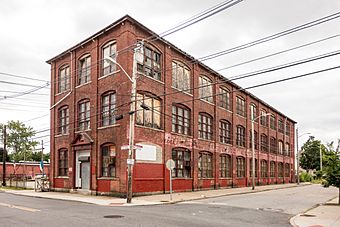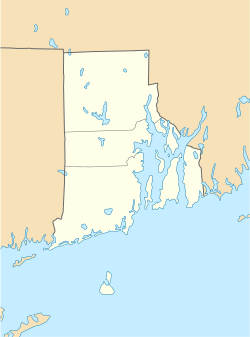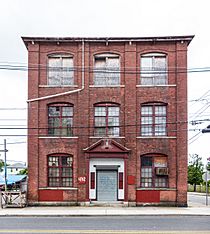William J. Braitsch and Company Plant facts for kids
Quick facts for kids |
|
|
William J. Braitsch and Company Plant
|
|
 |
|
| Location | 472 Potters Ave. Providence, Rhode Island |
|---|---|
| Area | 0.7 acres (0.28 ha) |
| Built | 1892 |
| Built by | N. B. Horton |
| Architect | George W. Cady |
| Architectural style | Late 19th Century Industrial |
| NRHP reference No. | 16000443 |
| Added to NRHP | July 11, 2016 |
The William J. Braitsch and Company Plant is a historic factory building in Providence, Rhode Island. It was built in 1892. This building was very important for the city's silversmithing industry. In 2016, it was added to the National Register of Historic Places. This means it's a special place worth protecting because of its history.
Contents
What Does the Building Look Like?
The Braitsch Company Plant is in the Elmwood neighborhood of Providence. It sits at the corner of Potters Avenue and Melrose Street. The main part of the plant is a three-story building made of brick. It has stone decorations.
The windows are shaped with rounded tops and are set back into the walls. Brick columns go up to a decorative ledge at the top. The roof is gently sloped and covered with a special material. Inside, the building has strong wooden beams and thick floors. Some parts were even made stronger with steel. Next to the main building is a smaller boiler house. There is also a separate concrete block room that was used for dry cleaning later on.
The Story of the Braitsch Plant
Who Was William J. Braitsch?
William J. Braitsch came from New York City. He learned how to make jewelry by working for a famous artist named Louis Comfort Tiffany. In 1887, William Braitsch and his business partner, John Hearn, moved to Providence. They started a business making decorative tops for walking canes.
Building the Factory
Hearn & Braitsch built this factory in 1892. It was designed by George W. Cady and built by N. B. Horton. However, their partnership ended the very next year. After that, William Braitsch ran the factory by himself.
Challenges and New Uses
William Braitsch's business faced tough times during the economic downturn of the 1890s. He eventually closed his business in 1915. As his company struggled, Braitsch started renting out parts of the factory to other businesses. Most of these were also in the jewelry industry.
In 1915, a company called Colonial Laundry took over the entire building. They operated their laundry business there until 1965. After that, the building was used again for making jewelry. Since 1987, it has mainly been used for storage.




